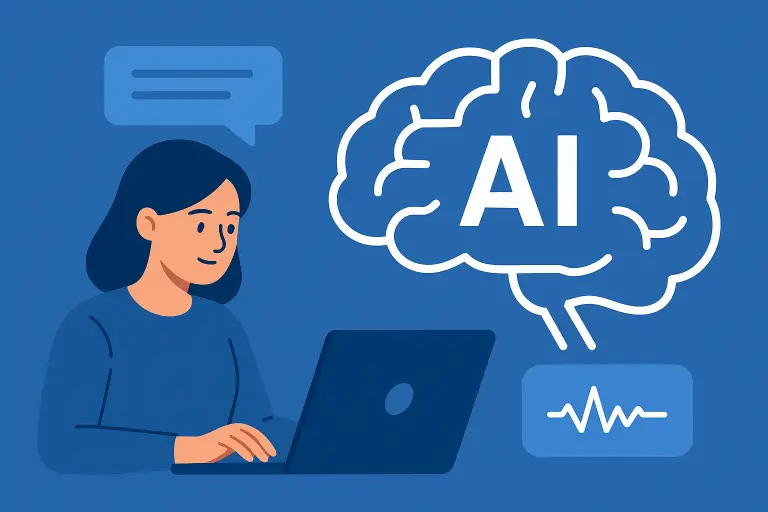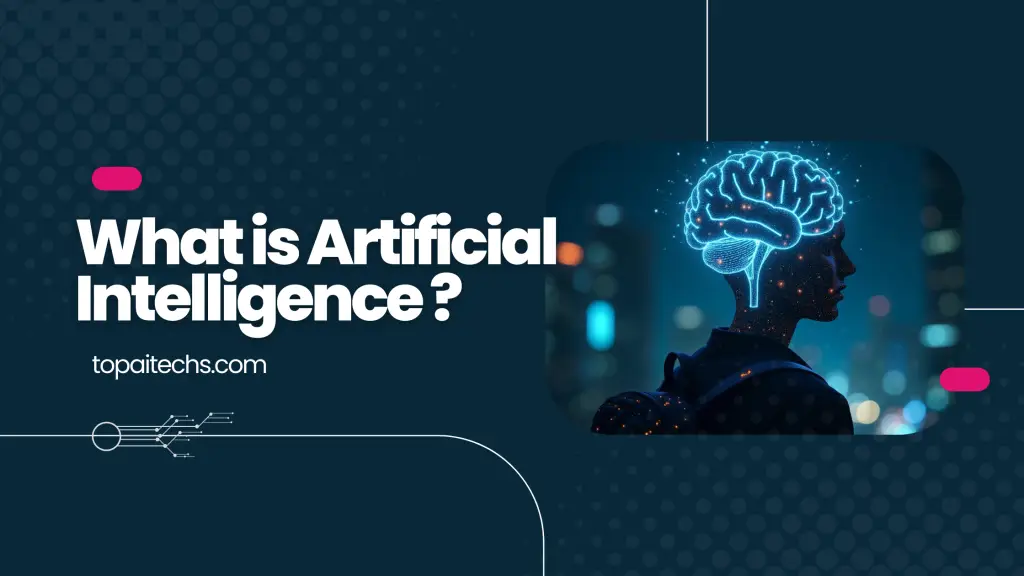Introduction (What is AI?)
Imagine asking your phone what the weather is like today when you wake up. It provides you with precise information in a matter of seconds, makes fashion recommendations, and even advises leaving early due to possible heavy traffic. It’s artificial intelligence (AI) at work, not magic.
However, what is AI exactly? Is there much more to it than what we see in movies, or is it just about robots? This article will explain artificial intelligence (AI), including its definition, operation, uses, advantages, difficulties, and potential effects on society. You will have a thorough, approachable understanding of this intriguing technology by the end.
Table of Contents

What is AI?
The ability of machines, particularly computer systems, to mimic human intelligence is known as artificial intelligence (AI). Learning, problem-solving, reasoning, decision-making, and even comprehending natural language are all included in this. Simply stated, artificial intelligence (AI) is the process of teaching computers to think and behave intelligently, much like humans, but frequently at a far faster and more precise scale.
Important Aspects of AI
1. Machine Learning (ML): Without explicit programming, ML teaches machines to learn from data and get better over time.
2. Natural Language Processing (NLP): This technology gives machines the ability to comprehend, decipher, and react to human language (such as voice assistants or chatbots).
3. Computer Vision: Assisting machines with the interpretation and analysis of pictures or videos (used in medical imaging, facial recognition, etc.).
4. Robotics: integrating AI with mobile devices that can communicate with their surroundings.
5. Expert Systems: Computer programs created to make choices in particular domains, such as engineering, law, or medicine.
A Short History of AI
AI is not a novel idea. Actually, it started in the 1950s when researchers like Alan Turing started examining the possibility that machines could think. AI has gone through phases over the years, including “AI winters” when interest and funding slowed down after periods of excitement and rapid growth.
But in the past 20 years, AI has exploded thanks to developments in big data, cloud computing, and powerful processors. AI is now used in everything from self-driving cars to Netflix recommendations.
How Does AI Work?
AI analyses vast volumes of data, looks for patterns, and then uses those patterns to predict or make decisions. This is a streamlined, step-by-step procedure:
1. Data Collection: AI systems gather vast quantities of data, including text, speech, numbers, and images.
2. Data Processing: The information is sorted and cleansed.
3. Training: Algorithms that learn from the data are used to train AI models.
4. Testing: To determine the model’s performance, tests are conducted.
5. Prediction/Decision: Lastly, the AI system has the ability to offer outcomes, responses, or suggestions.
Real-World Applications of AI
AI is now a reality in our daily lives and is no longer just science fiction. Here are a few instances:
1. Healthcare AI assists physicians with robotic surgery, X-ray analysis, and early disease detection. AI tools, for example, can identify cancer symptoms more quickly than conventional techniques.
2. AI is used by business and finance banks for risk analysis, fraud detection, and customer service. AI-powered chatbots respond to millions of questions daily.
3. Education AI makes learning more individualised by providing students with lessons that are tailored to their individual strengths and weaknesses. AI is used by platforms such as Duolingo to make language learning enjoyable and flexible.
4. Transportation AI plays a major role in navigation, traffic forecasting, and safety for self-driving cars made by companies like Tesla.
5. Media & Entertainment AI makes sure we always find content we like, whether it’s Netflix suggesting shows or YouTube suggesting videos.
6. Everyday Existence AI is used by smart assistants like Google Assistant, Alexa, and Siri to simplify our lives.
Benefits of AI
1. Efficiency: Compared to humans, AI can process data more quickly and precisely.
2. Cost Savings: Businesses can cut expenses by automating repetitive tasks.
3. Availability: AI can work around the clock and doesn’t require breaks or sleep like humans do.
4. Decision Support: By examining patterns and forecasts, AI assists businesses in making better decisions.
5. Innovation: AI propels advancements in space exploration, medicine, climate change mitigation, and other fields.
Challenges of AI
Despite its strength, AI is not flawless.
Concerns about Job Loss: Many people worry that AI will supplant human workers in professions like journalism, driving, and customer service.
Bias & Fairness: AI may make biassed decisions if it is trained on biassed data.
Privacy Concerns: AI systems frequently need personal information, which raises privacy issues.
Cost of Development: Developing sophisticated AI systems can be highly costly.
Ethical Issues: Should AI make life-or-death choices, as in autonomous vehicles?
The Future of AI
AI has an exciting but uncertain future. Experts forecast:
Healthcare Revolution: AI could aid in the search for treatments for serious illnesses. AI will improve energy, waste, and traffic management in smart cities.
Creative AI: AI is already capable of producing artwork, music, and articles. It might work with people in even more inventive ways in the future.
General AI: At the moment, AI is “narrow,” or task-specific. Artificial General Intelligence (AGI) could be developed in the future and be able to carry out any intellectual task just like a human.
But given these possibilities, society needs to make sure AI is applied sensibly, morally, and securely.
Opportunities for Internal and External Linking
Internal link suggestion: Provide links to related articles such as “How Machine Learning Works” or “Top AI Tools for Businesses” if this piece appears on a technology blog.
Idea for an external link: Cite reliable sources such as Stanford AI Research or the MIT Technology Review on AI.
Conclusion
Artificial intelligence has arrived and is influencing industries and our daily lives all over the world. It is no longer a sci-fi fantasy. AI is improving speed, intelligence, and efficiency in a variety of fields, including healthcare and entertainment. But great power also comes with great responsibility. How humans decide to use AI will determine its future. Thus, keep in mind that you are witnessing the wonders of artificial intelligence in action the next time you ask your voice assistant a question or see a tailored online recommendation.
